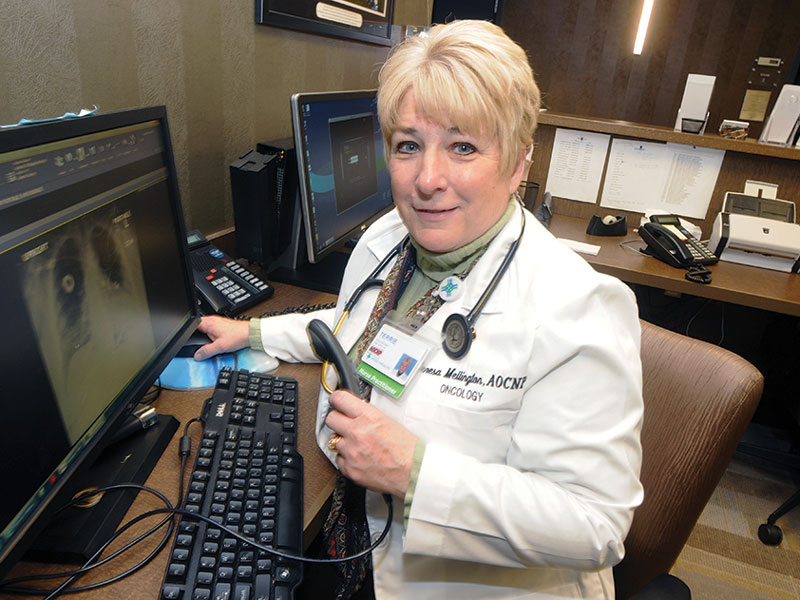Competencies Create Expert, Accountable Nurses Delivering Quality Care
When the National Academy of Medicine, formerly the Institute of Medicine, released its 2010 report, The Future of Nursing: Leading Change, Advancing Health (http://nationalacademies.org/hmd/Reports/2010/The-Future-of-Nursing-Leading-Change-Advancing-Health.aspx), it cited a need for improvement in nursing education and practice through the implementation of nursing competencies.
Since then, the nursing profession has answered the call, by strengthening practice through education, mentorship, preceptorship, and regular competency assessment and validation. By assessing and measuring competency levels and addressing gaps in practice, nurses continue to deliver excellence in care through all stages of the cancer trajectory.

The Importance of Oncology Nurse Competencies
In an oncology setting, patients and families rely on nurses in many ways that are unique to cancer care. Acting as educators, translators, care providers, and a patient’s lifeline requires oncology nurses to maintain a high level of knowledge and expertise. By applying nursing competencies, oncology nurses will meet recommended levels of safety in nursing practice. This entails learning the complexities of care for patients with cancer, navigating interdisciplinary team work, and integrating safety standards in practice, among a litany of other responsibilities required to deliver evidence-based oncology nursing care.
According to ONS member Michele Gaguski, MSN, RN, AOCN®, CHPN, APN-C, administrator of oncology services for Kennedy Health in Sewell, NJ, “Nursing competencies are the application of your knowledge of oncology concepts and oncology practice and how you apply them in a clinical practice environment.”
As an administrator, she sees the changes in nurses after they achieve competency in their practice. “When nurses obtain competency, they have a new confidence that they are able to do something safely, effectively, and efficiently. This ultimately results in positive outcomes for patients.”
For many oncology nurses, competencies are more than a measure of their level of knowledge and training. “Competencies are a reflection of our commitment to those who entrust us with their care,” ONS member Terrie Mellington, RN, MSN, ACNP-BC, AOCNP®, of Humility of Mercy Health in Youngstown, OH, says. “They’re our promise to those who seek care at our facilities that they will be treated by nurses who have demonstrated the knowledge and expertise to provide care in a safe and effective manner, helping to ensure quality outcomes.”
As the first and last points of interaction for patients, oncology nurses must have the resources, mentorship, education, and training they need to ensure quality care for their patients and positive outcomes for their practice.
Addressing Gaps in Competency
Because oncology care is a highly specialized subset of nursing, it requires a correspondingly higher level of training and education. Nurses new to oncology may find themselves overwhelmed by the complexities and high-acuity level of care required for patients with cancer.
“Oncology education in nursing programs is often limited,” Mellington notes. “New nursing graduates lack the training needed to fully comprehend the enormous challenge of caring for patients with cancer and their caregivers. Even seasoned nurses can be intimidated by the complexities of oncology.”
Mellington says that her institution offers opportunities to close those educational gaps and provides nurses with chances to meet competency levels. “We offer shadow opportunities as well as preceptor training, and we also provide educational opportunities throughout the year that include lunch and learns, pharmaceutical-sponsored events, and annual cancer symposiums,” she says.
From Gaguski’s perspective, challenges in competencies often arise when entry-level nurses change clinical settings or newly graduated nurses begin practice. “A majority of oncology care is delivered in the ambulatory setting, whereas new nurses completing basic nursing curricula in school are coming from primarily inpatient and community-focused environments. This may lead to a gap in knowledge of key concepts in delivering cancer care in an ambulatory care settings. Initial competency assessment by the individual, manager, and preceptor are key to aligning achievement of competency for the new nurse. Adopting and applying the concepts to ambulatory practice can be a challenge.”
Ongoing competency assessment is also crucial for seasoned nurses. Assessing and measuring competency supports nurses’ ongoing development to ensure safe, evidence-based nursing care.

“Whether it’s a test, a peer review, or direct observation, a variety of methods can be applied to measure competency,” Gaguski says. “We can’t just rely on an educational program to say, ‘Now you’re competent.’ You have to be able to apply those things in clinical practice and do it safely.”
Mellington also cited ways her institution measures competencies. “The ONS Chemotherapy Biotherapy Fundamentals of Administration course (https://www.ons.org/content/chemotherapy-biotherapy-fundamentals-administration) is the standard for competency for interventional radiology RNs assisting with chemo-embolization and for nurses performing bladder installations with a chemotherapy agent,” she says. “All inpatient staff who care for patients with cancer are required to take an online training annually for safe handling of agents. This includes healthcare workers who may come in contact with hazardous drugs through urine, emesis, etc.”
Finding Mentors and Preceptors
Identifying gaps in practice and competency is just one facet of addressing nursing competency in practice. Closing those gaps and achieving successful levels of education and training can be challenging, especially without the right guidance or mentor to lead the way. Many institutions select and assign preceptors or mentors to help prepare novice oncology nurses to meet their competencies head on.
Our preceptors are seasoned nurses in good standing who are oncology certified nurses, as well as holders of ONS chemotherapy biotherapy provider cards.
“Both inpatient nurses who administer chemotherapy, as well as nurses new to our oncology units, are paired with preceptors,” Mellington says. “Our preceptors are seasoned nurses in good standing who are oncology certified nurses, as well as holders of ONS chemotherapy biotherapy provider cards. The duration of time spent with the preceptors varies according to the individual nurse’s needs and job functions. Preceptors spend time observing the nurse in action to certify skills and competencies.”
Gaguski recognizes the added benefits of pairing preceptors with nurses. “The importance of having a very clinically sound preceptor and seeking out a mentor along their professional path will not only help develop the hands-on skills that new nurses require, but will contribute to their professional development and commitment to lifelong learning and skill development.
“In my experience as a clinical nurse specialist,” Gaguski continues, “preceptors attended a competency class and education, and they have to perform the function of a preceptor at least annually to continue in the preceptor role. I’ve learned that effective preceptors aren’t always the nurses who’ve worked the longest. It can be effective to have a nurse serve as a preceptor with two to five years of experience and strong demonstration of oncology competencies and communication skills. This is a nurse who can really relate to new or incoming nurses.”
Facing the Challenges of Nursing Competencies
Reaching and maintaining competency levels can be a daunting task, but it’s worth it. Beyond the requirements for accreditation in institutions, competencies provide nurses with fundamental knowledge and the tools needed to deliver expert cancer care to patients across many disease types. But both Mellington and Gaguski recognize that it’s not always easy getting there.
To Mellington, a few obstacles can impact institutions seeking full competency for nurses. “Staff turnover is the biggest challenge associated with maintaining competencies. For some, the cost associated with certification and training can also be a barrier for staff,” she says.
Gaguski notes the benefits of having of a clinical educator, staff development nurse, or clinical nurse specialist on staff. “Sometimes, nurses may feel more inclined to talk to a clinical specialist than the nurse manager to identify gaps in competency. Staff relate to this role differently and will openly seek you out for learning opportunities. You’re not necessarily evaluating them in a formal manner, and that can make them more comfortable speaking up to review concepts or address knowledge gaps,” she says.
However, numerous professional resources exist for nurses to learn more about the importance and value of nursing competency. “I think ONS does a great job supporting nursing competencies—they have the core competencies for the nurse generalist, specific competencies such as the nurse navigator competencies, and leadership competencies,” Gaguski says. “Oncology nurses can access professional organizations such as ONS to learn more about competency and competency development.”
Ultimately, patients with cancer call on their nurses in countless ways and regularly rely on their knowledge and expertise throughout the cancer journey. Achieving mastery in oncology nursing care through continued competency assessment, validation, education, and training leads to safe practice, quality care, and continuous professional and personal development for oncology nurses.
